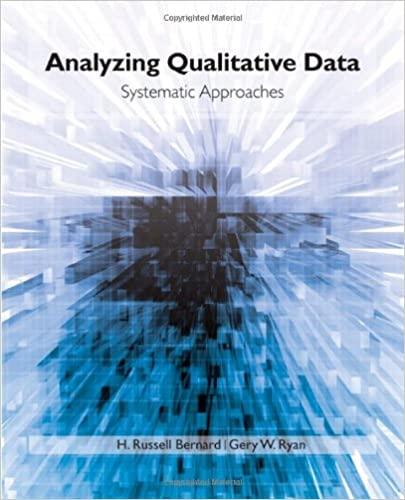Question
Look at what others have said and respond with your original opinions. Please don't just repeat what you've read. 1. I agree, children are like
Look at what others have said and respond with your original opinions. Please don't just repeat what you've read.
1. I agree, children are like little sponges that absorb information and behaviors from their environment and the people around them. It is so important to be a positive role model in our children's lives. They are learning about the world as they grow. Parents should shower their kids with love, support, and protection. The goal is bring out the best in them. When children grow up in a home of abuse and neglect. They are more than likely to continue patterns of abuse and hurt others. In my opinion I do not think children should be exposed to violence. Children perform behaviors that they have seen before or think is okay. I think children who bully are abuse or have been exposed to violence. The parent contributes to bully behavior. What are your thoughts about child bullies?
2. I think it is of vast importance to utilize more then one theoretical approaches when working to define family violence. I feel like the social learning theory and the ecological systems theory go hand in hand. After all, both theories emphasize the affect a child's learning environment has on their development. They learn from behaviors they witness at home, at school, and in other social situations as well. The behaviors they exert have to come from somewhere since we aren't born already knowing how to behave. When a child's environment is violent or physical, then that becomes what they know to be normal. As you stated, with the ecological systems theory, they look at a family's economical status, their living situation, and even community resources or lack there of. Unfortunately, when parents are financially challenged, they are often times experiencing extreme stress. When under this kind of stress, they may act out of character and abuse thie children physically or emotionally. I think there are many factors behind child abuse and as people entering the helping profession, I think it is important to examine all the theories and be ready to consider them in any given situation.
3. The intergenerational transmission of violence theory is an intriguing concept. It offers insight into how abusive behaviors may persist within families for generations and be passed from generation to generation. Your experience and professional work further support its validity; though it may be distressing to recognize the harm done by using physical punishment as a form of communication within your own family, it's crucial that we acknowledge and learn from such experiences. Breaking the cycle of violence may seem an insurmountable task, but it is possible. Recognizing harmful patterns and taking steps toward change are vital first steps; then coming together as a community to build healthier environments for future generations requires conscious effort. Professional guidance or support groups can offer invaluable assistance on this journey.
4. Awesome post in this week's discussion when it comes to substance and addictions. I really like how you mention how a person lack of freedom and movement can cause threats and altercation the will leads into domestic abuse. Substance abuse does heighten the risk and surly makes it harder on the user to have the proper judgement when under the influences very great post.
5. Substance abuse accounts for many violent and abusive behaviors. Alcohol contributes to violent behaviors because it disrupts the the person's ability to control and suppress their urges (Martens, 2022). Aggression is more likely to be expressed when a person abuses alcohol because they loose the ability to control their emotions and behaviors. Alcohol myopia can occur when a person abuses alcohol, meaning they can misunderstand a small gesture as a serious reason to get angry (Martens, 2022). Cognitive reasoning is interrupted by alcohol, people are unable to make good decisions, control feelings of anger, and lose the ability to effectively solve problems (Martens, 2022). Those who abuse alcohol are more likely to commit violent offenses against innocent victims. Alcohol abuse is correlated with violence. Every year an average of 300,000 people who have experience violence say their aggressor consumed alcohol (Martens, 2022). I think that are far more victims that have experienced violence, but they are not reported.
6. Reading your post gave me a new perspective, and I even had to read the article you mentioned. You've highlighted an essential aspect of substance abuse and its impact on the abuser and the victim. I never stopped and considered that when both parties are under the influence of drugs or alcohol, the dynamics of an abusive relationship can become even more complex and dangerous.
Victims of abuse may avoid seeking help or reporting the abuse due to the negative perceptions and embarrassment surrounding it. The fear of being doubted, judged, or losing custody of their children (if relevant) can lead to their reluctance to speak up. They get it with both the stigma of the trauma and of the substance use disorder.
Do you believe that preventing someone from seeking help for their substance use disorder qualifies as a type of domestic abuse?
Step by Step Solution
There are 3 Steps involved in it
Step: 1

Get Instant Access to Expert-Tailored Solutions
See step-by-step solutions with expert insights and AI powered tools for academic success
Step: 2

Step: 3

Ace Your Homework with AI
Get the answers you need in no time with our AI-driven, step-by-step assistance
Get Started


